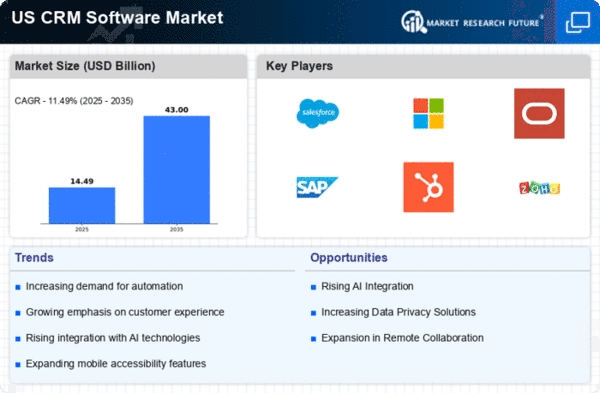Rise of Mobile CRM Solutions
The rise of mobile crm solutions is significantly impacting the crm software market, as businesses seek to empower their sales teams with on-the-go access to customer information. With the proliferation of smartphones and tablets, mobile crm applications enable sales representatives to manage customer interactions and access critical data from anywhere. This flexibility is crucial in today's fast-paced business environment, where timely responses can make a substantial difference. Reports suggest that mobile crm solutions can enhance sales productivity by up to 30%. Consequently, the crm software market is likely to expand as organizations adopt mobile-friendly platforms to improve their operational efficiency.
Increased Focus on Data Security
As data breaches and privacy concerns continue to rise, The CRM software market is witnessing an increased focus on data security.. Businesses are becoming more aware of the importance of safeguarding customer information, leading to heightened demand for crm solutions that prioritize security features. Compliance with regulations such as GDPR and CCPA is also driving this trend, as organizations seek to avoid hefty fines and reputational damage. It is estimated that companies investing in secure crm systems can reduce the risk of data breaches by up to 40%. This emphasis on security is likely to shape the future of the crm software market, as firms prioritize solutions that offer robust protection for sensitive data.
Integration of Advanced Analytics
The integration of advanced analytics into the crm software market is becoming a critical driver for businesses aiming to optimize their operations. By utilizing data analytics, organizations can gain valuable insights into customer behavior, preferences, and trends. This capability allows for more informed decision-making and targeted marketing strategies. Recent statistics indicate that companies employing data-driven strategies can improve their marketing ROI by as much as 15%. As businesses increasingly recognize the value of data in enhancing customer relationships, the demand for crm software equipped with robust analytical tools is expected to rise, further propelling the crm software market.
Growing Demand for Customer-Centric Solutions
The CRM software market is experiencing a notable shift towards customer-centric solutions., driven by businesses' need to enhance customer engagement and satisfaction. Companies are increasingly recognizing that personalized interactions can lead to higher retention rates and increased sales. According to recent data, organizations that prioritize customer experience can achieve up to 60% higher profits compared to their competitors. This trend is compelling businesses to invest in crm software that offers advanced analytics and customer insights, enabling them to tailor their services effectively. As a result, The CRM software market is likely to see sustained growth as firms seek to leverage these tools to foster stronger relationships with their clientele..
Expansion of Small and Medium Enterprises (SMEs)
The expansion of small and medium enterprises (SMEs) in the US is a significant driver for the crm software market. As SMEs increasingly recognize the value of customer relationship management, they are investing in crm solutions to streamline their operations and enhance customer interactions. Recent data indicates that SMEs account for approximately 99.9% of all US businesses, highlighting their potential impact on the market. By adopting crm software, these enterprises can improve their sales processes and customer service, leading to increased competitiveness. Consequently, The CRM software market is poised for growth as more SMEs seek to leverage these tools to drive their business success..

















